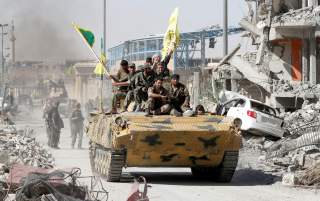Raqqa Will Rise Again
For the third time in its history, the Syrian city of Raqqa is in ruins. Its revival will help reveal the secrets of humanity's past.
The modern-era storehouses near the mastaba in Heraqla became the external storage site for a considerable number of artifacts that would not fit in Raqqa’s museum. Many of these artifacts disappeared during ISIS’ rule over the city, and even pieces that remain—such as mosaics from Deir Zakka monastery—are threatened by damage to the storage buildings, which exposed them to the elements. However, four kilns at the site are once again making traditional bricks in the style that has been used for millennia in Raqqa. These bricks will serve to accurately restore damaged sites throughout the area, like the city wall, museum and Qasr al-Banat.
Upon Harun al-Rashid’s death in 809 AD, his widow Zubeyda moved the caliphate’s capital back to Baghdad. Raqqa declined in importance over the next several centuries, though it remained a center of thought and writing. The city would find itself caught between aspirants to regional power in Aleppo and Mosul, reminiscent of its position in the third millennium BC between Ebla and Mari, and later between the Greeks/Romans and the Persians in the classical era. It would experience a short revival before its destruction by the Mongols in the mid-thirteenth century, but would then be mostly dormant until the twentieth century brought it back to life. The supposedly enlightened twenty-first century would bring mostly death and destruction.
SO WHAT does the future hold for Raqqa’s past? After two years of revolution, a chaotic interim, more than three years of ISIS rule, and a brutal air and ground campaign to liberate the city, it is struggling to survive. Given the immediate human needs of Raqqa’s population, is preserving the past much of a priority? Abdul Salaam Al-Ojeili, Raqqa’s most famous author (and doctor, and politician) of the twentieth century (d. 2006), didn’t think the Arabs cared much for old buildings and ruins generally. He wrote that poetry was the true expression of the Arab spirit, as it traveled with Arabs in their nomadic lifestyle; care for ruins was a Western concern, static and not dynamic. The efforts of those in Raqqa working to preserve the city’s architectural and archaeological heritage would suggest that Mr. Ojeili’s maxim did not apply to his hometown, at least not in 2019. Mohammad al-Izzo, the living memory of Raqqa’s historic sites, says that it certainly did not apply to the writer himself; he says Mr. Ojeili was in fact very interested in the architectural heritage of his city and country.
Should the United States decide to withdraw its troops from the area, a move proposed by President Donald Trump at the end of last year, the work to recover Raqqa’s archaeological heritage could be undone. ISIS cells remain under the surface and if the United State leaves, those cells, and others looking to upset the city’s precarious balance, will try to destabilize the city, putting Raqqa’s people, and their history, in danger once again. Turkey has threatened to invade areas under the control of the Syrian Democratic Forces, who currently control Raqqa. A Turkish-backed invasion of Afrin in the northwest led to massive destruction of historic and religious sites.
Restoration and preservation efforts in Raqqa have a long way to go. Is the day near when archaeologists can return to Tell Zeidan and uncover what other mysteries that site may reveal? When will the city’s museum be open again for visitors? And for what visitors? However unlikely it may seem now, the long sweep of Raqqa’s history would suggest that life will return to normal in this thrice-destroyed city.
Samuel Sweeney is a former Congressional staffer and is now a writer and translator based in the Middle East. He has a master’s degree in Islamic-Christian Relations from l’Université Saint-Joseph in Beirut.
Image: Reuters

